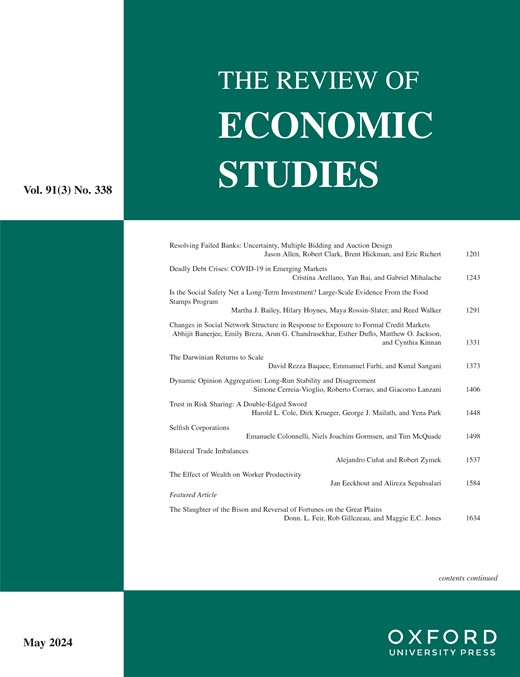Follow the Money
IF 6.4
1区 经济学
Q1 ECONOMICS
引用次数: 0
Abstract
Abstract I study, both empirically and theoretically, the economic and financial consequences of corporate lobbying. Firms lobby politicians to increase their share of government contracts, but political competition creates firm-level risk, inflating their cost of capital and reducing their incentive to invest in research and development (R&D). I document an annual 6–8% return premium for stocks of high-lobbying firms, which compensates investors for political risk. An estimated model in which firms can lobby and innovate and investors are risk averse replicates key features of corporate lobbying in the U.S., including the well-established paradox that lobbying contributions are small relative to the policies at stake. The model predicts that if investors ceased seeking compensation for political risk, R&D investment would increase by 6% and the innovation rate by 0.4% points. The risk-premium costs of lobbying are quantitatively and economically important even if the resources “wasted” on lobbying are objectively small.跟着钱走
本文从实证和理论两方面研究了企业游说的经济和金融后果。公司游说政客以增加他们在政府合同中的份额,但政治竞争造成了公司层面的风险,增加了他们的资本成本,降低了他们投资研发的动力。我记录了高游说公司的股票每年6-8%的回报溢价,这补偿了投资者的政治风险。公司可以游说和创新,而投资者厌恶风险的估计模型复制了美国公司游说的关键特征,包括一个公认的悖论,即游说贡献相对于所涉政策而言很小。该模型预测,如果投资者停止寻求政治风险补偿,研发投资将增加6%,创新率将提高0.4%。游说的风险溢价成本在数量上和经济上都很重要,即使“浪费”在游说上的资源客观上很小。
本文章由计算机程序翻译,如有差异,请以英文原文为准。
求助全文
约1分钟内获得全文
求助全文
来源期刊

Review of Economic Studies
ECONOMICS-
CiteScore
10.40
自引率
3.40%
发文量
75
期刊介绍:
Founded in 1933 by a group of young British and American economists, The Review of Economic Studies aims to encourage research in theoretical and applied economics, especially by young economists. Today it is widely recognised as one of the core top-five economics journals. The Review is essential reading for economists and has a reputation for publishing path-breaking papers in theoretical and applied economics. The Review is committed to continuing to publish strong papers in all areas of economics. The Editors aim to provide an efficient and high-quality review process to the Review''s authors. Where articles are sent out for full review, authors receive careful reports and feedback. Since 1989 The Review has held annual May Meetings to offer young students in economics and finance the chance to present their research to audiences in Europe.
 求助内容:
求助内容: 应助结果提醒方式:
应助结果提醒方式:


